
160 One On One Meeting Questions for Managers and Employees
Unlock the power of AI — Notta's meeting assistant records, transcribes and summarizes meeting minutes with one click.
“The main purpose of a one-on-one is mutual teaching and exchange of information.”
Andy Grove - Former CEO of Intel
In the modern workspace, regular one-on-one meetings are vital for managers and employees to discuss performance, share updates, and give feedback. And to make them productive rather than wasting time, asking the right questions means a lot. Not only will you stand a better chance of making the meeting effective, but you can also build a stronger relationship.
Let’s face it. Managers and employees alike struggle with what questions to ask in a one-on-one meeting and how to say them tactfully.
To make it easier for you, we’ve compiled 160 one-on-one meeting questions that cover a wide range of topics. Keep reading!
What do you talk about in one-on-one meetings?
To make the most out of the time you spend in one-to-one meetings, it makes sense to have a rough structure so that you can discuss specific topics.
These themes can cover all areas of work, such as:
Performance: As a manager, you can discuss individual performance with your employees, the overall performance of the team, and improvements you can work together to achieve
Growth: This could involve setting individual professional or personal goals, team-based targets, how to recognize employees for their efforts, compensation and rewards, and possible training and career development in and out of work
Work/Life balance: You can touch on the specific workload for each employee, organizational changes to schedules and processes, personal issues outside of work if they’re affecting morale or motivation, and changes you can make to support your team
Communication: From how employees talk to each other within a project or team, to cross-department communication and the tools they use to discuss action points
For effective one-to-one meetings that don’t turn into boring status updates, both managers and employees should come prepared with questions that address each of these themes. This allows everyone to be on the same page about current issues and gives a safe, positive environment to discuss challenges and offer feedback.
How can you broach these topics? We’ve put together a comprehensive list of questions for one on one meetings, broken down into categories, that both managers and employees can ask. First, let’s dive into one-on-one questions to ask employees.
Notta automatically generates clear, shareable transcripts with action items, facilitating comprehensive record-keeping. Live transcribe your Google Meet, Microsoft Teams, Zoom, Webex meetings.
For managers: One-on-one questions to ask employees
Questions about growth and development
One-on-one meetings are the ideal situation to discuss your employee’s growth and development in their role within your company. There are rarely other opportunities you’ll get to discuss specifics about their wants and needs, strengths, and areas of improvement. In fact, taking the time to talk through career advancements shows your employees that you truly care about their job satisfaction and progression.
Taking the time to understand what’s missing from your staff’s hard and soft skills and putting a plan in place helps them feel more engaged in their work. In turn, employees are more invested in their careers.
According to LinkedIn’s 2018 Workplace Learning report, 94% of employees would stay longer at a company if it invested in their career.
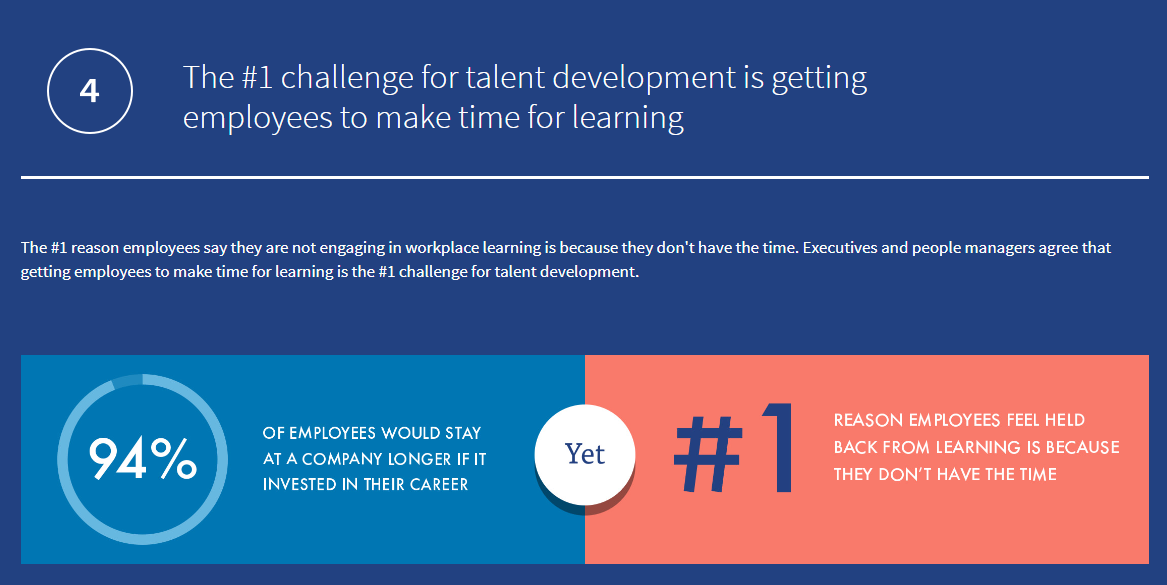
Screenshot from LinkedIn’s 2018 Workplace Learning and Development Report
Some employees may not know what support they need, so it’s crucial to ask the right questions to discover what interests and motivates them.
Remember, using a transcription tool like Notta during your meetings can help you capture their answers so you can take action afterward.
1. Can you name a person in the company that you’d like to learn from, and what would you like to learn?
2. In the next 12 months, what professional goals would you like to achieve?
3. What’s something you’d love to try your hand at but haven’t because you don’t have the resources or time?
4. What else can I do to help you advance in your career here?
5. When you accepted your job here, is what you’re doing now what you expected?
6. What are your long-term goals?
7. Are there any other areas of the company you’d like to learn more about?
8. If there’s additional training you’d find valuable, what would it be?
9. What areas of your job do you find challenging?
10. Is there a way that I can help you develop your skills that I don’t yet do?
11. Are you happy with the pace we’re helping you advance your career?
12. What's one thing we could do today to help you with your long-term goals?
Questions about building trust
Building a rapport with your staff and listening to their goals, challenges, and interests is crucial for running a successful team. If there’s a high level of trust, employees feel confident in coming to you with their issues and share their creative ideas to help reach business goals, among lots of other benefits.
People who work at companies with high levels of trust experience 50% higher productivity, 74% less stress, and 76% more engagement according to ‘The Neuroscience of Trust’, an article by the Harvard Business Review.
The most effective way to build trust? Treat your employees like the interesting humans they are. Genuinely take an interest in their lives, concerns, and passions and care about them as individuals.
13. Do you have any pets and what are their names?
14. How are your kids doing? Are they enjoying school/college?
15. Have you managed to spend time with your parents/grandparents lately?
16. Are you happy with your work/life balance at the moment?
17. If you could choose one thing to improve at work that would positively affect your personal life, what would it be?
18. What motivates you to come to work each day?
19. In the next year or so, what's something interesting or fun you’d like to try for the first time?
20. What did you use to do for fun that you haven't had as much time for recently?
21. What’s the most interesting advice or information you’ve heard lately?
22. Is there anything that’s been on your mind in the last couple of weeks?
23. What kind of employee recognition would have the most positive impact on you?
Questions about giving and receiving feedback
Opening up a dialog with your employees in a private setting can reveal more honest feedback and comments about how you can improve as a manager and areas for improvement within your team. You’ll also have the chance to share your feedback about how your staff can improve aspects of the way they work, too.
You may already send out employee engagement or satisfaction surveys, but these could go unanswered. Having a chat face to face can offer more valuable feedback than what an employee could share within a written survey of sliding scales and multiple choice questions, as they’ll have the opportunity to share in their own words what they’re feeling.
The downside of receiving this kind of qualitative feedback is that it’s harder to measure. That’s why transcription is vital, so using Notta to record and transcribe your conversation captures the most valuable feedback. You can even create a summary using Notta AI to condense the most important comments into chapters and action points.
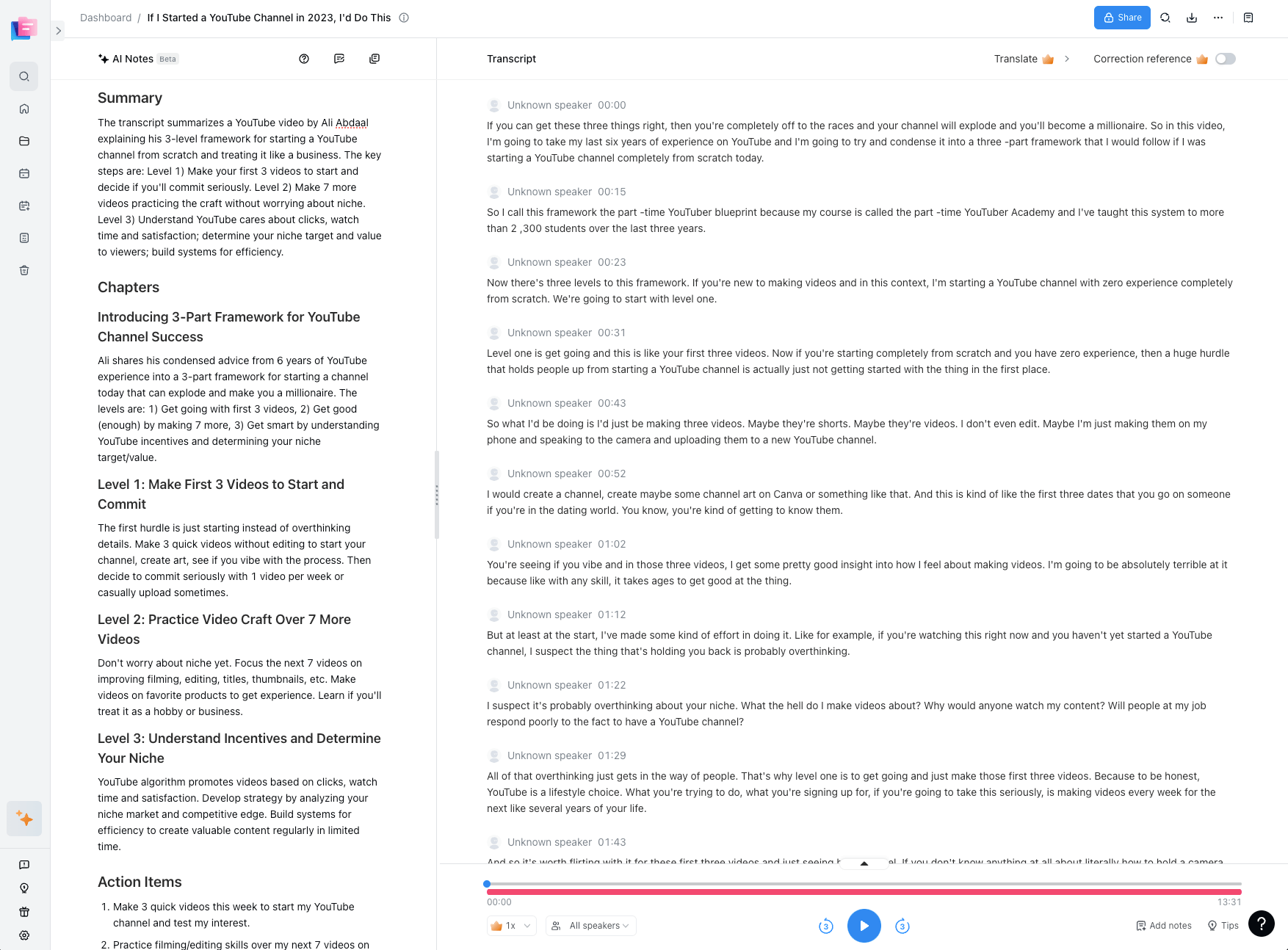
Here are questions to help guide your feedback discussion:
24. How do you prefer to receive feedback?
25. What’s the most helpful piece of constructive feedback you’ve received recently?
26. Is there anything I could give you feedback on right now?
27. Do you have feedback for me?
28. How can I better support you at work?
29. Is there any way I can help you enjoy your work more?
30. Do you feel you're getting enough feedback, and why?
31. What aspect of your job would you like more support with?
32. What's your favorite thing I do as a manager that I should keep doing?
33. Which project did I not give you feedback on that you would have liked?
34. Which areas would you like more or less direction from me?
Questions for improving your team or your company
Discussions in private are the perfect opportunity to address more sensitive topics such as problems within your team or in the company as a whole. One-on-one meetings allow you to talk about team members who aren’t quite pulling their weight, flaws in project management, or conflicts at work.
Employees are often the people closest to a project or process and offer valuable insights into what works well and areas that could improve.
Here’s how you can prompt the conversation using helpful questions:
35. Are you uncomfortable giving any of your team members criticism, and why?
36. Do you feel supported by your coworkers?
37. What aspects of our team do you wish you could change?
38. Has anyone on the team ever made you feel uncomfortable, and what happened?
39. What sort of person do you think would be a good fit here?
40. What are we doing right now that you think we should stop or start doing?
41. If you were the boss, what's the first thing you'd change?
42. What do you like or dislike about working here?
43. What would convince you to leave this company and find a job somewhere else?
44. Do you think our company is loyal to its employees?
45. Is everyone pulling their weight on the team?
46. What is the biggest problem at our company right now?
Questions for gauging their happiness in the workplace
You might have already heard that unhappy, stressed-out employees cost businesses an estimated $500 billion a year in unproductive work and sick days, so keeping employees happy and enthusiastic is key to a successful business.
Happy workers are more creative, productive, and helpful. They take less time off work as they experience higher levels of physical and mental health. In turn, customers receive better support. Overall, it’s a great feeling to come to work surrounded by positive people!
Asking the right questions isn’t just about discovering what makes your employees happy—it’s also about addressing pain points or potential issues before they cause distress or ongoing problems.
Here are some questions that will help you discover what makes your workers tick:
47. On a scale of 1-10, how would you rate your current happiness with your job overall?
48. Are you happy with the balance between your work life and personal life?
49. Do you look forward to coming to work most days or do you dread it?
50. Do you feel you have strong relationships and camaraderie with colleagues?
51. What could I do as your manager to make your job more satisfying?
52. If you could have any role here, what would your dream job be and why?
53. What projects or responsibilities have you enjoyed working on recently?
54. What are you doing to take care of your mental and physical health?
55. If you could work on anything for the next month, what would it be?
56. What would make you leave this job for another?
57. What aspects of your job do you find most frustrating or disappointing?
Questions for remote employees
As remote employees work in their own homes or while traveling, they often don't get the chance to speak to team members or you as a manager on a one-to-one basis. Even group meetings can be few and far between, leaving remote workers feeling more isolated than in-house team members.
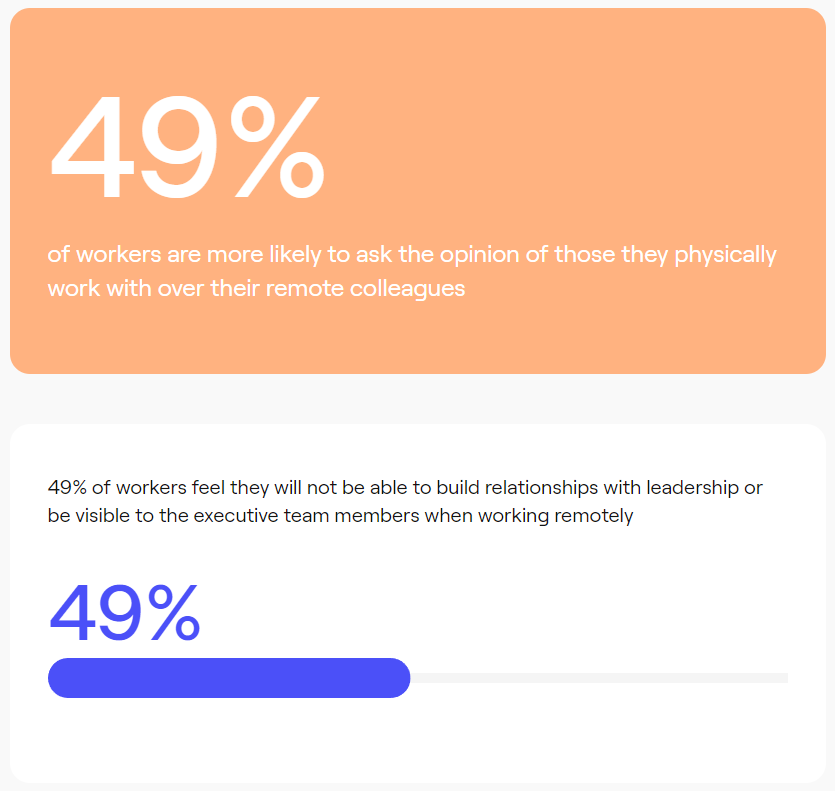
Screenshot from Owl Labs’ State of Remote Work 2022 Report
People who work from home feel less involved and worry that not being part of an in-house team affects their career progression, according to Owl Labs’ State of Remote Work 2022 report. That’s why face-to-face meetings over video are a crucial part of looking after your team when they’re not in the office. With the right questions, you’ll learn how they schedule their work days, what struggles they face, and the support you can give them so they can do their best work.
To help capture the key points from your video meeting, you can add your meeting link to Notta and live transcribe in Zoom, Google Meet, or Microsoft Teams.
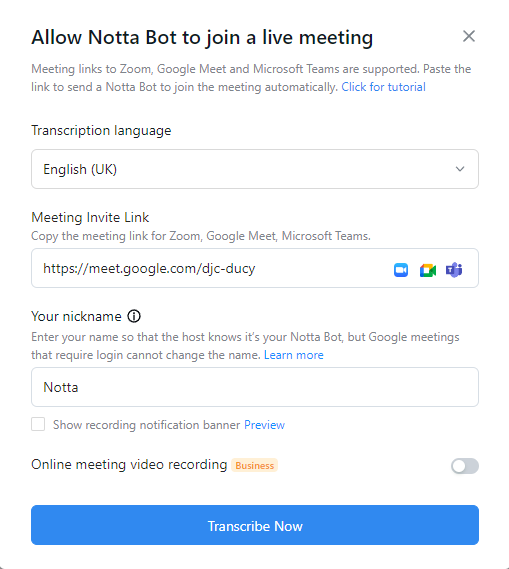
With Notta, you can easily generate meeting minutes, turning spoken content into written records with 98.86% accuracy. Stay organized and capture every key detail in your meetings.
58. How long have you been working remotely?
59. What helps you feel connected to others and counteract the potential loneliness of working remotely?
60. What's your work setup like?
61. Do you feel like you have opportunities for "water cooler” type discussions with the team to help you spur on ideas?
62. What's most challenging for you in your daily work routine?
63. How do you manage distractions during the day, and is it a challenge?
64. How is your work/life balance right now?
65. What's your favorite part about working remotely?
66. Do you feel you have the resources and equipment you need to do your job effectively from home?
67. Do you feel you receive enough feedback about your work?
68. Do you feel our remote communication and collaboration tools are working effectively?
69. What are your ideas to help build team culture remotely?
Questions to lead your team through a crisis
In moments of crisis, it’s vital your team sticks together to ride out any problems. Left unchecked, rumors and misinformation about the state of the company might spread and cause distress and uncertainty.
One-to-one meetings offer an opportunity to set the record straight and discuss concerns so everyone is on the same page. You’ll get the chance to talk about the status of your team, active projects, and the company’s plans for the future.
Questions to ask could include:
70. How do you feel about our company's current prospects?
71. What questions do you have about our company right now?
72. What can I do to help you feel more confident or comfortable in your position?
73. How do you think your work impacts our team and company?
74. What has surprised you the most about this experience so far?
75. How are you taking care of yourself during this demanding period?
76. What risks or potential issues related to the team keep you up at night?
77. What are one or two things you’d suggest I do differently during this time?
78. How is morale on the team?
79. How satisfied are you with the level of transparency and communication from me?
80. What questions do you still have that I can give you clarity on?
Questions for being a great coach to your team
Your job as a manager isn’t as straightforward as delegating tasks or overseeing projects. Your team sees you as a coach to help them achieve their goals and support them through tough times.
In a one-on-one environment, you can prompt your employees to discuss what challenges they’re facing. With the right questions, you’ll be able to figure out how you can be a better coach and mentor, developing a plan or process to get around obstacles and improve your skills as a manager.
81. What frustrates you or makes it much harder for you to learn?
82. What medium, format, or approach helps you learn best?
83. What are ways we could improve our one-on-one meetings to make them more valuable?
84. What other roles or cross-training are you interested in?
85. What are your top priorities right now?
86. How can I help position you for future growth opportunities?
87. What challenges are you facing collaborating with your team members?
88. What types of training or development opportunities would help you right now?
89. What questions or concerns would you like to discuss that you haven't had a chance to yet?
90. If there’s one problem I can help you solve right now, what would it be?
One-on-one questions and answers aren’t just for managers to ask their staff. As an employee, it’s your chance to discuss issues that you’re passionate about, show initiative, and improve your chances for a promotion or career direction change. Next, we’ll explore one-on-one questions for employees.
For employees: Questions for a one-on-one with your manager
Questions about career growth and personal development
If you feel disengaged with your work, don’t wait for your manager to bring up potential career opportunities—take the initiative and ask questions to explore your personal development. You’ll prove you’re ready to take on additional responsibilities and give them an idea of where your interests lie so that you get to work on projects that you’re passionate about.
Remember that you often don’t get a chance to express your feelings in a private setting with your manager, so take advantage of this time together.
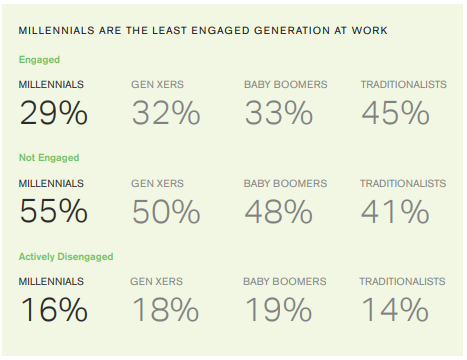
Screenshot from the Gallup report How Millennials Want to Work and Live
If you’re not sure what direction to take at work, we’ve got you covered with these questions for a one-on-one with your manager. We’ve included prompts to get your manager’s advice and opinions on how they can support you.
91. What type of training or courses should I take to progress in my career?
92. Which skills should I work on to explore various aspects of my job?
93. Where do you see my role evolving in the next year?
94. If I could improve one skill before our next one-on-one, which would you choose?
95. Given my skills, abilities & interests, what roles do you see as suitable for my future?
96. What strengths should I focus on?
97. Who should I develop a better working relationship with?
98. As you reflect on where the organization is going, do you have any thoughts on how I should improve and develop to best align with the business goals?
99. How can we make sure that I achieve my full potential?
100. What should I consider adding to my growth plan?
101. Are there any soft skills I should develop?
102. Who in the company can help me learn the most?
103. What skill gaps do you see on our team?
104. What upcoming conferences or events should I attend?
Questions about priorities, productivity, and strategy
One-to-one meetings give you a chance to understand more about your role and how it contributes to the overall business goals. Managers will be able to offer advice on how you can work more efficiently to meet these targets, plus you’ll get to understand where you should focus your efforts.
As an employee, you’re closest to the work you do and managers might not always see things from your vantage point. Asking questions about the future of the company in terms of new projects, hiring, and campaigns can help you better prepare.
These following questions can help you understand the bigger picture and where you fit in:
105. What steps can I take to help improve the team’s performance?
106. How can I support my team better?
107. What job role are you considering hiring next for our team?
108. What do you wish we did better as a team?
109. What’s worrying senior management right now?
110. Are there any tasks you want me to take on?
111. What big changes are coming in the next 6 months that will affect my role?
112. What are we doing to make ourselves stand out from our competitors?
113. What one or two things could I do to be more strategic in my day-to-day work?
114. Are there any processes or workflows I'm using that I could improve to maximize my productivity?
115. What are the most important problems I should be helping solve right now and how could I focus on those?
116. Are there any meetings or time commitments I could remove from my schedule?
117. Are there any projects or initiatives on the horizon I should start preparing for now?
118. How satisfied are you with the quantity and quality of my work lately?
Questions about communication and feedback
Communication in the workplace is vital for a business to run smoothly. From collaborating with your team and enhancing relationships to embracing changes and avoiding conflicts, communicating effectively is a key part of your role. Talking with your manager about how to communicate and how often can build trust and make your job more enjoyable—it’s no fun feeling out of the loop or unsure who to turn to if you have questions.
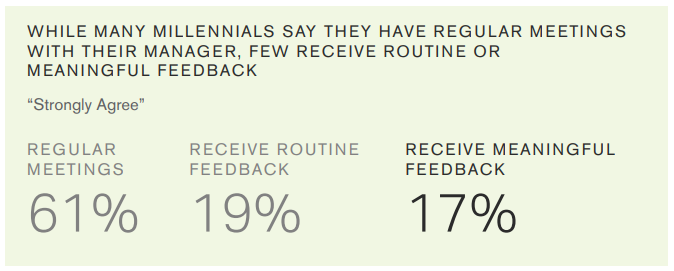
Screenshot from the Gallup report How Millennials Want to Work and Live
Carefully choosing your questions about communication helps facilitate more meaningful feedback from your manager, too.
119. What's the best way for me to communicate key information, updates, or requests to you?
120. How satisfied are you with the frequency and quality of our communication?
121. How open are you to questions and input from me?
122. How comfortable do you feel giving me constructive criticism or negative feedback when needed?
123. How well do I communicate when collaborating with my colleagues?
124. What metrics or progress reports would be useful for me to send on a regular basis?
125. Are there any instances lately where you feel my communication was unclear or confusing?
126. Are there any interpersonal issues or tensions I should be more direct in addressing with team members?
127. Are there any additional contacts or stakeholders you think I should communicate or collaborate more closely with?
128. What communication channels or tools would you like to see our team use more of?
129. Do you prefer I resolve minor issues independently or keep you in the loop on everything?
130. If you could change one aspect of our communication, what would it be and why?
131. How can I be better about soliciting feedback from you regularly?
132. What do you consider the most important communication or people skills I need to develop right now?
Questions about company culture and motivation
No one wants to come to work when there’s an awkward vibe or when you don’t agree with the company’s values. That’s why a discussion about company culture is a key part of both doing your job well and enjoying being a part of your team.
In fact, the importance of a strong company culture is rising. According to PWC’s 2021 Culture Survey, 67% of people believe it’s an important topic that executives should discuss.
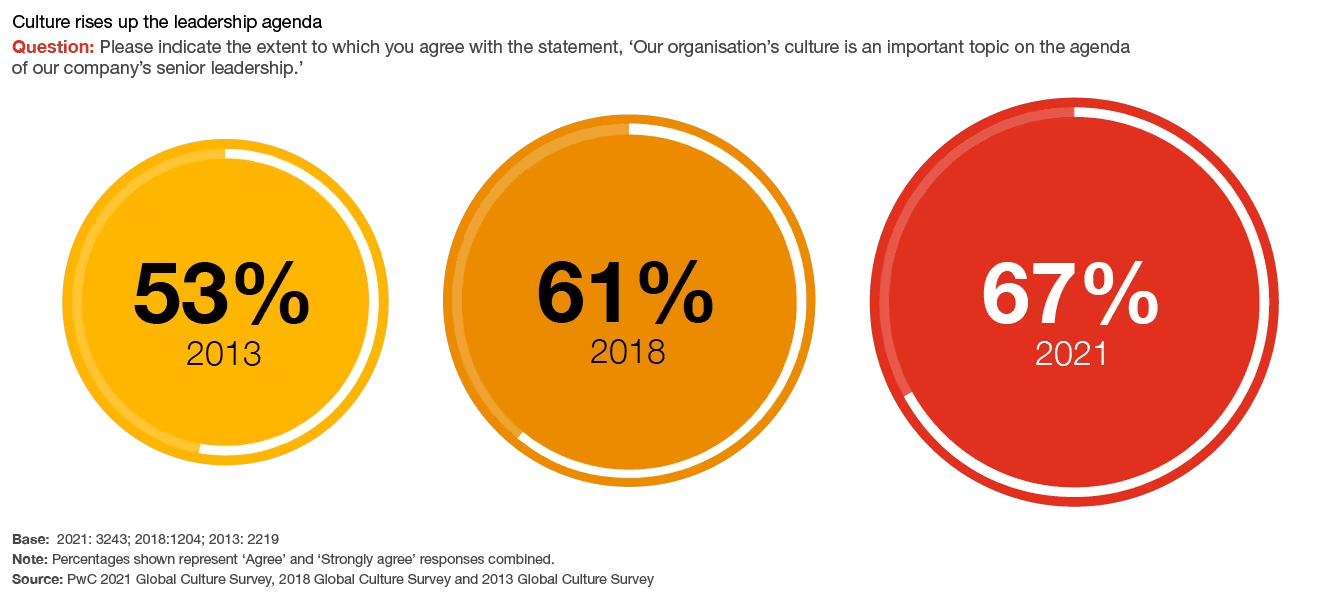
Address culture issues in your next one to one with the right questions to get a valid picture of what the company values are and any that you don’t agree with (and why). If you’re experiencing team problems, this private setting will likely make you feel more confident to speak up about them and work together to fix the issues.
You need to feel happy and engaged in your work, and everyone’s actions contribute to the company culture—whether you’re a new hire or you’ve worked there for years.
Here are some questions to get the conversation started:
133. Are there any recent changes in leadership, strategy or priorities that will impact the work culture here?
134. Are there opportunities for me to join or lead any workplace committees or groups?
135. What are some traits of the culture here that you think motivate employees?
136. Are there any ways I could help contribute to improving company culture and morale?
137. What initiatives are senior staff focused on this year related to employee engagement?
138. What social events or activities outside of work would help bring our team together?
139. What causes the most stress or dissatisfaction for our team and how can I help improve it?
140. How aligned would you say my values and work style are with the culture here?
141. How does leadership implement employee feedback on matters of company culture?
142. Are there opportunities for employees to job shadow or transfer departments to gain new perspectives?
143. What policies or programs are in place to support work/life balance and mental health?
144. What makes our mission meaningful to you, personally?
145. What do you do to avoid burnout?
146. After a failure, what do you do to pick yourself up again?
Questions about supporting your manager and managing up
Each manager has a different working style so discussing how you can support them in their leadership role, you’ll learn how to help them do their job better. In turn, you’ll work more efficiently and feel more satisfied with your job.
A great way to work on managing up is to take points from your one to one questions and answers, then formulate an action plan. When you record your conversation with Notta, you can summarize the topic and break it down into actionable tasks in one click using Notta AI. From there, you can build these actions into your daily workload.
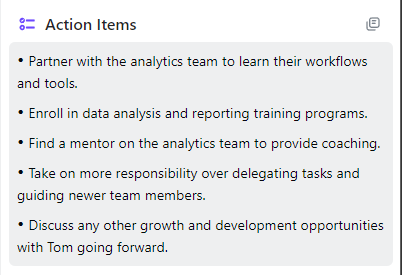
Helpful questions to manage up include:
147. What can I do to better support you and your priorities this quarter?
148. Are there any projects or tasks I could take off your plate to free up more of your time?
149. What daily frustrations or pain points could I help remove by taking over certain responsibilities?
150. How would you prefer I approach you when I need guidance or decision-making input?
151. What’s your biggest challenge as a people leader?
152. What meeting prep or administrative tasks could I assist more with to save you time?
153. Beyond my day-to-day responsibilities, are there any initiatives I could take on to demonstrate leadership?
154. What metrics would be most useful for me to track and report to help assess our team's performance?
155. Are there any processes I use that create more work for you?
156. Are there any areas where I have been too reliant on your input?
157. What upcoming deadlines or commitments should I be aware of to avoid adding pressure?
158. Are there opportunities for me to participate in leadership meetings?
159. Are there any internal or external contacts I could help nurture relationships with on your behalf?
160. What are your tips on upward management and working effectively with our executives?
Notta offers the most integrated AI meeting notes, summaries, and action items so nothing gets missed.
Bonus! Icebreaker One-on-one meeting questions
Before you get into the deeper questions in your meeting, you’ll inevitably start with a slight air of awkwardness. It’s possible that you don’t get a chance to speak freely on a one-to-one basis as manager and employee that often, so it could be tricky to know where to start!
You can use these icebreaker questions to get the conversation flowing—getting to know each other better will help you feel a bit more relaxed and build your relationship. After all, you work together, so it helps to get to know each other’s life outside of work, too.
What’s playing on your Spotify lately?
What are you looking forward to this week?
What are your most exciting plans for the rest of this year?
What’s the best book you’ve ever read?
What’s the most interesting place you’ve ever traveled to?
What do you enjoy doing in your free time?
How’s your family?
What’s your biggest pet peeve?
What’s the biggest challenge you have to face this week?
If you could learn any skill instantly, what would it be?
If you could live anywhere in the world, where would it be?
What’s your favorite way to spend a day off?
If you could choose anyone, who would you pick as your mentor?
What is something on your bucket list?
What is something you want to accomplish in the next 5 years?
What inspires and motivates you?
What are your personal goals for this year?
Get started with a one-on-one meeting template
Whether you want to talk about career opportunities, professional development, team collaboration, or anything in between, a one-on-one meeting template can maintain a great flow of the conversation and cover everything you intend to talk about!
While there are one-on-one meeting types for different purposes, and they may differ in structure, the shared goal is to cover the right talking points and follow up. For example, a classic one-on-one meeting generally follows this structure:
1. Informal check-in (5 minutes)
Discuss the employee's current well-being and state of mind to start the conversation in a friendly atmosphere.
2. Recent work recap (15 minutes)
An overview of the working progress, achievements, and challenges since the last meeting.
3. General feedback (10 minutes)
Share and receive feedback, then discuss any other topic of interest to the employee.
4. Upcoming work arrangement (10 minutes)
Discuss the work arrangement and priorities in the next period.
5. Wrap-up (5 minutes)
Discuss and agree on meeting takeaways and set action items.
In summary
Whether you are a great manager or an employee, these one-on-one meeting questions will surely guide you to a productive conversation.
It can be a little tricky to remember everything discussed during your conversation, so using a transcription tool takes that extra burden away so you can focus on listening and contributing your ideas. Notta can be a helpful choice whether you meet face-to-face or over video by providing a live recording and an AI-generated transcript. Make your free Notta account today.